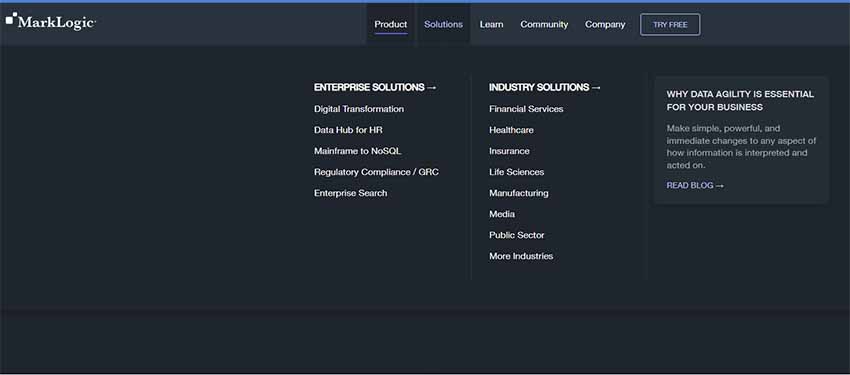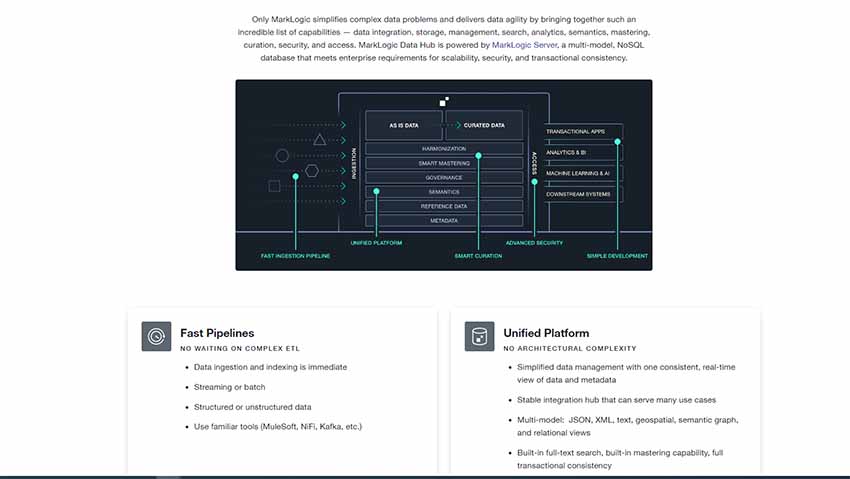In the 4.0 era, it is very important to set up an online database for your small business and it has many advantages for your company’s operational growth and financial growth.
So let’s learn about MarkLogic: The best data management software for small enterprise.
Contents
The Overview Of MarkLogic
MarkLogic is an on-premise and cloud-based data management software that enables enterprises to integrate, store, and retrieve data on a consolidated platform by utilizing operational and transactional NoSQL databases. It helps managers to gather data from many sources and index it for query and search purposes.
Organizations can manage and view data in JSON, XML, text, geographic, semantic graph, and relational perspectives using the multi-model framework. Administrators can grant specified users role-based access control and optimize data storage processes with lineage tracking and auditing features. Managers can also use harmonization flows to design data pipelines and probabilistic algorithms to match, integrate, and manage enterprise data.
MarkLogic provides an API that allows businesses to integrate the platform with a variety of third-party applications. The program is intended to assist enterprises in a variety of industries, including healthcare, insurance, government, media, manufacturing, life sciences, financial services, and others.
What Are The Features that Make MarkLogic Become The Best Data Management Software For Small Enterprise?
MarkLogic was designed with versatility and efficiency in mind, allowing you to securely integrate data, watch its progress, and safely share it in its curated form. We want to help data professionals achieve mission-critical objectives. Here are some key features that make MarkLogic is the best data management software for small enterprise:
ACID Transactions
You will need a database with all the features of ACID if you are running an operational and transactional system (Atomism, Consistency, Isolation, and Durability). These characteristics ensure that your enterprise-grade system will never experience data corruption, stale reads, or inconsistent data.
ACID compliance is a requirement in relational databases, however, MarkLogic is special among most NoSQL databases in that we support 100% ACID-compliant transactions, while other transactions with loosened or non-existent criteria. MarkLogic’s ACID features also apply to multi-document, multi-report, and XA transactions, providing unmatched reliability for running mission-critical, large-scale applications.
With MarkLogic, you can learn about you understand ACID Transactions.
Security certificate
Data security is essential to maintaining data integrity and trust. That’s why MarkLogic provides the detailed, certified security that businesses require to protect themselves from today’s cyber threats. MarkLogic is the most secure NoSQL database, with more advanced security features and certifications than any other NoSQL database. One of the reasons MarkLogic was chosen to handle the most demanding, mission-critical applications at the heart of huge investment banks, critical healthcare institutions, and systems classified by the government is because of this.
The Common Criteria for Information Technology Security Assessment (also known as the “General Criteria”) is an international standard that suppliers use to demonstrate their commitment and ability to provide security to their customers. their goods. Obtaining certification is a difficult and uncommon task. This blog will guide you further about the certification procedure. The list of certified providers is small and MarkLogic is the only NoSQL database on it.
Integrated Search
MarkLogic is a database with a built-in search engine that provides a single platform for loading data from silos and searching and querying across all of that data. MarkLogic employs a “Ask Anything” Universal Index, which indexes data as soon as it is loaded, allowing you to start asking questions of your data right away. Additional indexes can also be toggled on and off dependent on the user’s need.
For data integration, built-in search is particularly handy. It allows you to search and discover any new data imported into MarkLogic quickly, as well as maintain track of your data as you harmonize it.
The built-in search feature is also quite handy for application development. You can use it to create transactional and analytical apps that demand sophisticated queries to execute effectively, as well as to incorporate Google-like search functionality into an app.
Data Model Flexibility
MarkLogic is a multi-paradigm database at its core. JSON, XML, RDF, geographic data, and huge binary files can all be stored natively using MarkLogic (e.g. PDF, images, videos). This method makes it easy to import all the data and make modifications later. Load all your data as-is, including both structured and unstructured data (and metadata!), without time-consuming ETL operations. Continue if you need to add another data source or make modifications to your schemas later.
To store and manage semantic data, MarkLogic includes an RDF Triple Store (a type of graph database). This function is called MarkLogic Semantics. Semantics improves the document model by providing an intelligent mechanism for connecting and enriching JSON and XML documents stored by MarkLogic, which is critical for robust querying and data integration.
Deployment Flexibility
Build your application once and execute it anywhere, whether on-premises, virtualized, or in the cloud, with MarkLogic. Other databases require you to choose where to deploy up front, and there is minimal flexibility to modify later. Most other databases are purpose-built for each environment; depending on the environment, you run different versions of that vendor’s software.
Another reason is a vendor-biased licensing model—if you relocate to the cloud, you must purchase a new cloud-specific license. MarkLogic offers a different approach: the product is the same. You receive one enterprise product that runs in your preferred environment. It is OK to begin on-premises and migrate to the cloud later. MarkLogic has also been running in production cloud environments for nearly a decade.
Geospatial
Our database provides a unified platform for storing, managing, and searching geographical data such as places of interest, intersecting pathways, and regions of interest. As MarkLogic also manages data about entities (people, places, and things), relationships (semantics, or “linked data”), pictures and video (huge binaries), and time, all of that data is stored with context (temporal data).
HA/DR (High Availability and Disaster Recovery)
MarkLogic provides enterprise-grade High Availability and Disaster Recovery (HA/DR) to ensure that your data is always available and scheduled downtime is minimized, lowering risk and preventing interruptions. Your data is always available on a secure platform with unrivaled data resilience. Surprisingly, most other NoSQL databases are not like this. When a node fails, almost every database offers high availability.
Elasticity and scalability
When enormous amounts of data must be integrated, it is critical to have a database that scales quickly, easily, and affordably. However, elasticity—the ability to scale down in response to shifting demand—is also essential. MarkLogic is a massively scalable Enterprise NoSQL database that scales horizontally in clusters on commodity hardware to hundreds of nodes, petabytes of data, and billions of documents while continuing to execute tens of thousands of transactions per second.
When demand falls, MarkLogic may scale down without having to bother about sophisticated sharding. With these features, businesses can handle massive amounts of data and run large-scale online applications without breaking the bank.
Stackable Storage
The MarkLogic Tiered Storage add-on feature enables you to store and manage data in different tiers based on cost and performance trade-offs, whether you’re using flash storage, traditional local or shared disk storage, HDFS, or Amazon cloud storage.
Tiered Storage allows you to effortlessly migrate data between tiers without the need for ETL, new software, or costly infrastructure changes. This enables you to effortlessly balance performance and capacity throughout your data’s lifecycle, achieving performance SLAs, simplifying data governance, and meeting regulatory needs.
Reasons MarkLogic Is The Best Data Management Software For Small Businesses
If you’re looking for a data management software that can handle your small business’ data needs, you should definitely consider MarkLogic. This software is well-suited for businesses with a limited number of employees, as it is easy to use and has a low learning curve. Additionally, MarkLogic offers a wide range of features that can help you manage your data more efficiently. If you’re looking for the best data management software for your small business, you should definitely check out MarkLogic!
Fast transmission
- Data acquisition and indexing are instantaneous.
- Streaming vs. Batch.
- Use the usual tools for organized or unstructured data (MuleSoft, NiFi, Kafka, etc.).
Unified Platform
- Data governance is simplified with a consistent, real-time view of data and information.
- Stable integration center with a wide range of applications.
- JSON, XML, text, geography, semantic graphs, and relational views are all supported.
- Built-in full-text search, complete mastery, and transactional consistency.
- It is less expensive than a ‘do it yourself’ data center.
Smart management
- Make it easier and faster to enrich, harmonize and aggregate data.
- Only model what you ask for when you ask.
- Embedded machine learning data center UI for ease of use and collaboration.
The Semantic Graph
- Provide smarter search and insights.
- Create advanced knowledge graphs.
- RDF and SPARQL standards are used.
- The scale reaches hundreds of billions of triples.
- Icon for cloud data security.
Advanced Protection
- Enterprise-level security that is certified.
- Capabilities for full data lineage tracking and auditing.
- Granular controls for roles, permissions, and privileges, among other things.
- Advanced data encryption in motion and at rest.
- Icon for simple development.
Easy Development
- Easy distribution of consistent, fit-for-purpose, use-case-driven data assets.
- Building data-driven microservices with an agile, DevOps approach (10x faster results than with relational).
- Consider objects rather than rows and columns (though MarkLogic also supports standard SQL).
- APIs and programming languages that are industry standards.
Price Of MarkLogic
Currently, MarkLogic offers 4 versions to meet diverse needs:
For Essential Enterprise: From $18k/Year
For Essential Enterprise: AWS or Azure: From $0,99/Hour
For Developer: Free
For Data Hub Service: Consumption based
Conclusion
If you are running a small business, choosing database management software for your company is an absolute necessity. However, the software must meet the requirements of good quality, good service, and reasonable cost. So, MarkLogic is the best data management software for small enterprise in our opinion. Hopefully, the information we provide you about MarkLogic will help you better understand it and choose the right business management software for you.







